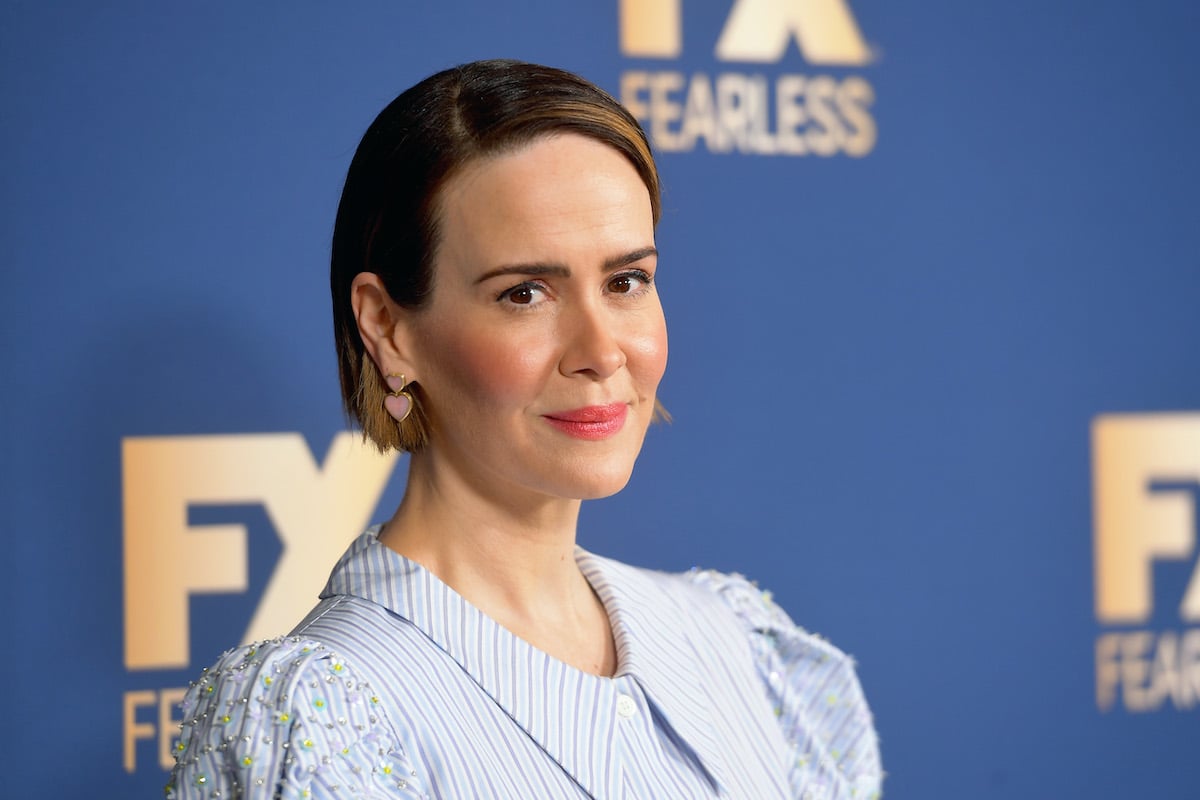The premiere of Impeachment: American Crime Story is just around the corner after a nearly year-long COVID delay. There’s a lot to be excited about, after Ryan Murphy’s last two seasons of ACS—The People v. O. J. Simpson and The Assassination of Gianni Versace—proved to be compelling reexaminations of sensationalized media events. That Murphy brought Monica Lewinsky on as producer to tell her own story went a long way to instill trust in audiences that this show has the potential to do right by a woman who was treated so unjustly for so long.
There was, however, one element of the show that still had us concerned, or at the very least, incredibly irritated. Earlier this year, set photos from filming made the rounds on Twitter showing Sarah Paulson, who is playing Linda Tripp, Lewinsky’s one-time “friend” and confidant who secretly taped and released their phone calls.
In the set photos, Paulson looked to have gained some amount of weight for the role but was also wearing a fat suit.
The backlash at the time was fairly intense. And in a new interview with the LA Times, Paulson has addressed the reaction, which sounds like it took her by surprise.
“It’s very hard for me to talk about this without feeling like I’m making excuses,” Paulson says. “There’s a lot of controversy around actors and fat suits, and I think that controversy is a legitimate one. I think fat phobia is real. I think to pretend otherwise causes further harm. And it is a very important conversation to be had.”
She goes on to say:
But that entire responsibility I don’t think falls on the actor for choosing to do something that is arguably — and I’m talking about from the inside out — the challenge of a lifetime. I do think to imagine that the only thing any actor called upon to play this part would have to offer is their physical self is a real reduction of the offering the actor has to make. I would like to believe that there is something in my being that makes me right to play this part. And that the magic of hair and makeup departments and costumers and cinematographers that has been part of moviemaking, and suspension of belief, since the invention of cinema. Was I supposed to say no [to the part]? This is the question.
That’s a bit muddy. I don’t think anyone would argue that the “entire responsibility” here falls on Paulson, but I get why it might feel like that, since she was literally the face (and body) of this conversation. However, the “magic of transformation” argument has long been used to erase fat people (along with other marginalized groups) from these sorts of discussions.
It’s not just that this role could have gone to a larger actress, although that is definitely part of it. (This is where the “best person for the role” defenders will inevitably start making that argument. And while I think Sarah Paulson is perfect for just about every role, we can also acknowledge that claiming no one else could also play is part is not just demonstrating a lack of creativity, but it’s become a blanket argument to shut down valid criticism without further discussion.)
The use of fat suits isn’t just denying work from fat actors. It also informs the way society views fat people. It reinforces the idea that fatness is something that can (and should) be put on and taken off like a costume. And even when not played for laughs, fat suits look unnatural, “which contributes to the stigmatization of fat bodies” as this astute Twitter user put it:
So in addition to the good tweets I have already seen about the Sarah Paulson/Ryan Murphy fat suit debacle, a numbered list of some additional points
1) Fat suits always look bad and unnatural, which contributes to the stigmatization of fat bodies
— Mean Fat Girl- 🏳️🌈💄 (@Artists_Ali) April 29, 2021
It’s good that these conversations are finally gaining mainstream attention. It’s clear that Paulson, like a lot of people, had never thought about how casting thin actors to wear fat suits contributes to the stigmatization of fat bodies.
“I think the thing I think about the most is that I regret not thinking about it more fully,” she told the newspaper. “And that is an important thing for me to think about and reflect on. I also know it’s a privileged place to be sitting and thinking about it and reflecting on it, having already gotten to do it, and having had an opportunity that someone else didn’t have. You can only learn what you learn when you learn it. Should I have known? Abso-f—ing-lutely. But I do now. And I wouldn’t make the same choice going forward.”
(via LA Times, image: Matt Winkelmeyer/Getty Images)
Want more stories like this? Become a subscriber and support the site!
—The Mary Sue has a strict comment policy that forbids, but is not limited to, personal insults toward anyone, hate speech, and trolling.—










Published: Aug 30, 2021 02:09 pm